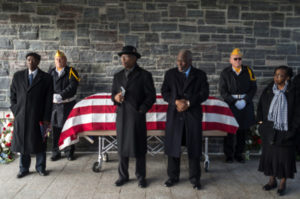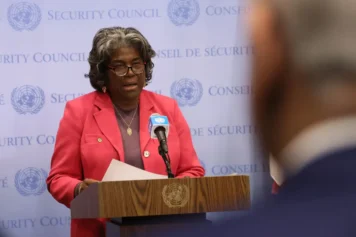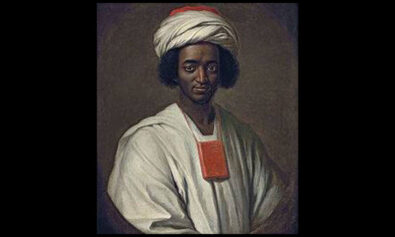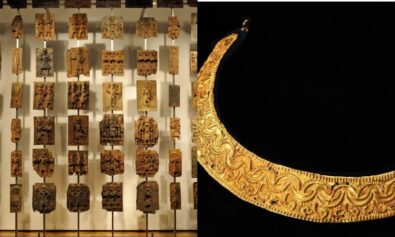
Deacon Ernest Williams or, “Deak,”as he was always called here in Albany, New York, was one of the near 700,000 African-Americans soldiers, heavily from the South and with a low level of literacy, whose lives were transformed by that war.
Deak, born to sharecroppers in Mississippi, was picking cotton by the time he was 7 years old. Of those days, he said simply, “Oh, they was hard times, hard times.” He never made it much beyond the third grade in school, and at age 17 he was drafted into the segregated army that took him to Normandy and beyond, as he, along with thousands of Black service troops, supplied the U.S. Army as it made its way across France and into Germany.
Even last year, when I jokingly spoke a few French phrases to him, the ones you would use when courting a young woman, he smiled in memory.
Deacon Williams never returned to the South when the war was over, settling instead in Albany, about as far north as one could come without crossing over into Canada. Here he married, settled down, and raised a family, laboring at what one might consider to be menial jobs, among them as a porter in a drapery shop.
The shop owner, recognizing his diligence, dexterity, and strength, promoted him to an outside position installing drapes and blinds. He worked with pride and exactitude, all the time focusing on the family and making sure that they had shelter over their heads and food on their table. In his spare time, in the summer, he might cast a fishing line or two into a local creek. His last job was as an attendant at a local family court, where he served until he was well into his eighties.
But first and foremost, he was a deacon in his church, and so he never missed a Sunday School, nor prayer meeting. And he went into the hospitals, taking prayer and good cheer to those who were sick and needed a smiling face, a cup of water, or a word of uplift. Every first Saturday of the month, he would serve as the cook for the soup kitchen—the regulars there loved his chicken vegetable soup, which he, in his frugal ways, could make serve a hundred people for less than sixty dollars.
Nor did the physical condition of the church escape his attention—no bulletins were to be left in the pews after service, nor light bulbs left unchanged. Even as arthritis assaulted his body, on Sunday morning his shirt was crisp and white, tie knotted as if for dress parade, and shoes sparkling. He was a long-time supporter of the local branch of the NAACP.
Last summer, to the surprise of everyone, Deak, leaky heart valve and all, decided to fly down to Mississippi for what would turn out to be his farewell visit there. He told everybody that he’d be back in a few weeks, but the weeks turned into months and he only returned to Albany toward the end of August to begin once again his yearly routine of church conferences and events.

In his last days, the deacon used to ask me to pray with him over the phone, and I’d do this every night around nine o’clock. We’d always preface our sessions by singing together the first verse of “Jesus, Keep Me Near the Cross.” But on the October night before he was to be found dead sleeping in his bed, with a smile on his face, he had started our session with a deep, Southern hymn, “Father, I Stretch My Hands To Thee, No Other Help I Know.” Just before then, he’d said, “Allen, I got pain tonight, we need special prayer.” I’d never before heard him complain about anything in life, neither weather, work, nor family problems. Everything was in God’s hands.
Numbered among the children of this one-time Mississippi share-cropper was an engineer, a graduate of RPI. But maybe the proudest day of his life—he brought the program to church so everyone could see—was the day his grand-daughter, Emma, graduated from Middlebury College, up in Vermont, as a member of Phi Beta Kappa, one of the highest academic honors a student can receive. Not bad going for the offspring of a Mississippi sharecropper.
Allen Ballard is a professor of Africana Studies and History at the University of Albany. Among his five published works of fiction and non-fiction are his prize-winning Civil War novel about African-American soldiers, “Where I’m Bound,” and his most recent work, “Breaching Jericho’s Walls,” a memoir of his journey from a segregated Philadelphia childhood to mid-century Paris, Moscow, Cambridge, and Manhattan. More information on his works may be found at http://www.allenballard.com.


